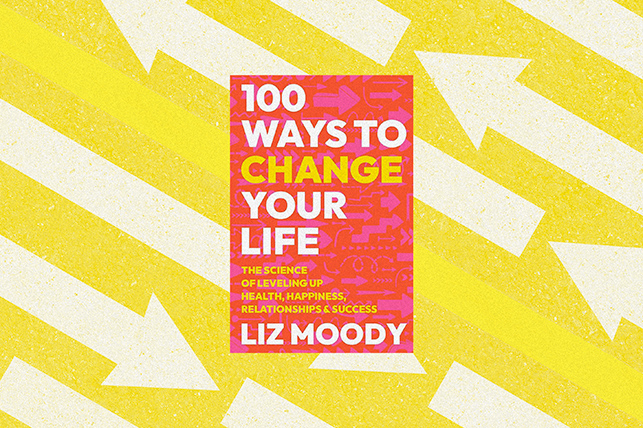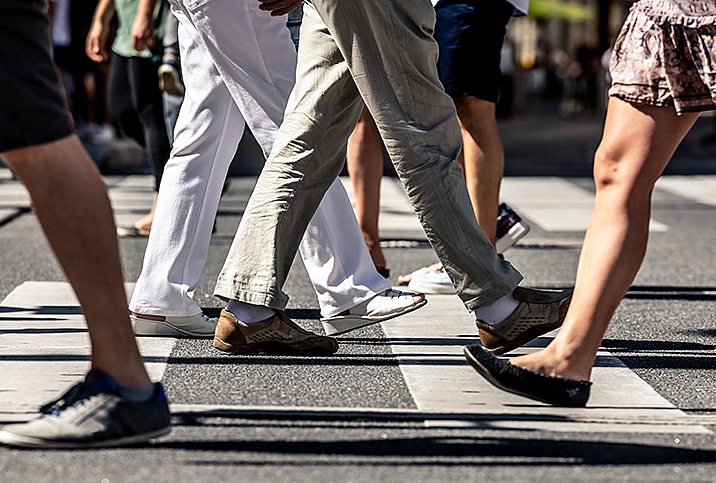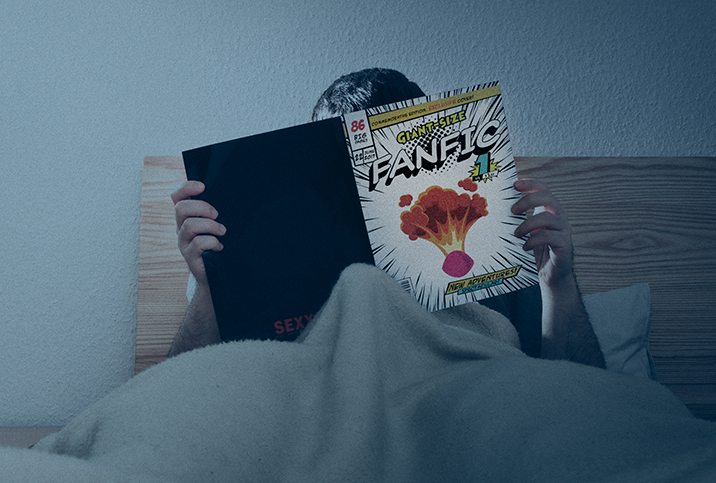Between the Pages: '100 Ways to Change Your Life'

Key Points
- Liz Moody has become a trusted source through her journey from agoraphobia and personal struggles with science-backed health and wellness advice.
- The book explores the interconnected nature of health, happiness, relationships and success, and the importance of addressing these aspects collectively rather than in isolation.
- The book helps people understand the concept of rewiring neural pathways for happiness and making conscious choices to lead a more fulfilling and intentional life.
If you're chronically swiping for health hacks on social media, there's a good chance Liz Moody has popped up on your "For You page." You might know her as the effortlessly cool girl nomad traveling the country with her husband and cat. Or perhaps you heard her revealing how never saying no changed her life. Maybe you saw her whipping up functional mocktails.
Unlike most influencers on the social channels, though, Moody shares tips backed by science, almost every time.
Moody has proven to be a trusted source and thought leader through her popular podcast, best-selling cookbooks and now with her new book, "100 Ways To Change Your Life." In it, she digs into the science of improving your health, happiness, relationships and success, which—spoiler alert—are all connected.
But Moody didn't always have everything all figured out. In her 20s, she became agoraphobic and so uncomfortable in her body it was impacting every element of her life, including her sexual health. She started emailing neuroscientists, hormone specialists and registered dieticians for answers and began to heal.
Today, she shares what she learned in her new book distilled from her many thousands of hours of expert interviews.
In this exclusive interview, Moody breaks down how every element of our health is connected, how she transformed her life and how you can do the same.
Editor's note: This interview has been edited for length and clarity.
Your book starts with your origin story explaining why you're always looking for science-backed ways to change people's lives. When did you realize this was your purpose?
Liz Moody: I was talking to my roommate maybe a month into my battle with agoraphobia. I opened up about the extent of my anxiety, which I never really shared with her before because I was embarrassed about it. She was like, "Oh, my boyfriend actually went through a really similar thing. What are you doing to help you in this situation?"
There's a tip in my book where we think vulnerability will make people like us less, but actually, it makes people like us significantly more. It felt as if in that moment, this thing I had so much shame about was the thing I connected with her about.
There's this whole group of people going through something and feeling shame about it. It made me want to shout from the rooftops, "You can feel better; you don't have to be where I was."
One of the purposes of my book is to say we can talk about this stuff and it doesn't need to be embarrassing or filled with shame.
Speaking of shame, so much of sexual health feels shameful to talk about because of the way most of us have been raised. In your journey to improve your life, how did you transform your sexual health?
I have interviewed so many experts in the sex field and it is shocking to me how much of good sex comes down to communication. When I was younger and in my "Sex and the City" era, I was having a lot of fun with a lot of different guys. My girlfriends and I would meet over brunch and we'd be like, "Oh my gosh, was he good in bed?"
It's interesting to me, because the more I've gotten into the research and the expert advice, I feel like there's no such thing as "good in bed." There's knowing what you need and what you like and being able to ask for it, and then your partner is an open recipient of that line of communication.
It's been so interesting to deconstruct all the messages we have about what makes a person a "good lover," when it all comes down to we're all trying to feel the best we can.
For me it's everything: I want to have the energy to take on my day. I don't want to be contending with gut issues. I want to have the money and the career success to set myself up for a good life. And I want to have pleasure in the bedroom in my body in this time I have on this planet.
It's what we're all going for. It's so strange to me we turned this into something shameful or something we shouldn't want or don't deserve.
Recommended
- Are You Having a Hard Time Getting Out of Your Head...in Bed?: Here are 8 strategies that will help you avoid being distracted during sex.
- How the Night Shift Affects Your Sex Life and Sexual Health: Your job may require you to work into the early morning, which can wreak havoc in the bedroom.
- Fear and Arousal: Why Does Fear Turn Me On?: If you're thinking of adding an element of fear to spice up your sex life, read this now.
For cisgender straight women, so much of what we talk about when we talk about sex revolves around the man's pleasure and not our own.
I have so many girlfriends who are contending with this. Where they feel guilt about the amount of time it takes them to orgasm because of what they're taught. I'm such a huge proponent of being aware of the subtle messages we're given all the time.
Every time we're watching a sex scene on TV or the movies, it's two minutes long and the people in it are coming together. Whether or not the scene is explicitly saying that women come in two minutes through penetrative sex, that's the message we're all internalizing. Every rom-com we watch says the fairy tale is about a person of the opposite gender falling in love. It's what we should be aspiring for. It's what a good life looks like. If God forbid, you don't have it, you don't have a good life.
All of these subtle messages are permeating our brains and they're making us feel bad about things that are incredibly normal and leading to things like the orgasm gap, which is just another form of misogyny and patriarchy.
[Editor's note: The orgasm gap is a term coined to describe the disparity in orgasms between heterosexual couples where women have way fewer orgasms than men.]
In your book, you have a section about how to take your sex life to the next level. Without giving too much away, can you tell us more?
[I have] a few favorite things for the bedroom. Number one: Communication first and foremost. I do think if we're not asking for what we want, we can't expect our partner to know what we want.
There are a million ways to ask for what we want. From affirmative noises to, "Oh, have you listened to this podcast?" One of my favorite tricks is just putting a podcast on loudly when your partner is around so they happen to hear it. I think it's a very subtle way to share what you want to share.
I think things like our libido connect to so much more than the bedroom. When people are sleeping badly, often they just want to focus on their sleep routine. They want to get the eye mask and the weighted blanket. But actually, how we're living our life all day long is the thing that may impact our sleep.
I think that's true for our sex life, too.
If we're burned out, if we're rushing around all day, we don't feel good in our bodies from a physical or psychological perspective. And then we're expecting to go into the bedroom and turn it on right away and have this amazing sex life? That's unattainable. It's just another avenue to feeling bad about ourselves.
There's a reason this book isn't just like, "How to uplevel your relationship" or "How to uplevel your body." It's everything all together because everything is all connected.
If you don't feel like you're on the right path in life and you can't get a handle on your career, you're not going to come home feeling sexy and want to go at it in the bedroom. If you have digestive distress all of the time, it's going to impact your sex life. Your sex life is going to impact your ability to feel awesome at your job and go after a promotion. It's all connected and I think it's important to avoid viewing things in a siloed perspective.
Is Kissing Considered to Be More Intimate Than Sex?: For some, locking lips is considered the top-tier method of physical intimacy. An intimate kiss may not be sexual, but for many, it's the ultimate foreplay.
In focusing on this last year, what one thing changed your life?
There's a tip in the book I love because it is so easy to do and we can all do it all day without anybody knowing we're doing it, without really devoting any extra time to it. It's about rewiring your neuropathways for happiness.
Rick Hanson, Ph.D., a world-renowned psychologist from the UC-Berkeley Greater Good Science Center, calls it "growing the good."
The idea is our brain always likes to take the neural pathways it's most used to. If you have a thought you think over and over—"I'm so stressed out," "I hate my body," "I'm never going to be able to do the things I want to do"—your brain is like, "Oh, that's an easy path. I see that path. I'm just going to take that path over and over." And you'll feel the results of taking that path over and over.
What you can do is consciously make those good paths, so your brain is more likely to take those paths in the future, whenever you feel a little bit of good. Like watching a beautiful sunset or perhaps you're cuddling your cat and sniffing its neck and you're just like, "What do they put in this fur? It smells so good." Maybe you're having great sex with your partner and thinking, "Oh this was worth doing even though I was tired, even though I was stressed out."
In those little moments of good, just linger on it and appreciate it for five seconds longer than you normally would. It's going to make the pathway a little bit more defined. Next time, your brain is more apt to take that pathway.
I think it's one of the biggest secrets to happiness. It's free. We can all do it every day and it's changed my life.
Do you find it difficult to do this in the age of social media? So often when we're experiencing a good or happy moment, instead of being present and enjoying it, we grab our phone to capture it.
It doesn't have to be either/or. You can take a picture of your food and then you can sit and go, "How cool is it that I can photograph and document my food to share it?" and "How delicious is this crepe I'm eating?" It doesn't have to be all or nothing.
It's one of the things I like about this book, too. I'm not asking you to overhaul your entire life. I'm saying we have all of these tiny choices, and every time we make a tiny choice, we're pointing our ship in the direction of the life we want to live—or away from the direction of the life we want to live. I'm just giving you all the tools and the science you need to steer your ship in the direction of your dream life.
Furniture Can Make Sex More Accessible—and Fun: Hands-free toys and props give you the chance to get creative and experience new sensations. Props may also help ease pain and add pleasure for people with (or without) a disability.
You're living proof this works. You went from being agoraphobic and unable to leave your bed to living this gorgeous nomad life. How do you think you got to this place of such extreme transformation?
From my agoraphobia and anxiety, [it was] when I built some structure into my life. I think the lack of structure I had when moving to England, the lack of community, really fed my anxiety.
Robert Waldinger, M.D., had the longest-running study of adult happiness and thriving at Harvard and came to the conclusion the number-one predictor of a long and happy life is having a strong community.
When I moved back to New York and built structure and community back into my life, I felt a huge difference. It's why so much of the book focuses on things I haven't seen talked about as much, broadly. Things like how to make friends as an adult, how to have support in your peer community at work, how to feel more connected to your partner and how to have better relationships with your family members. I do think community is an often under-discussed element of wellness.
On a more esoteric level, I took a second and I chose the life I wanted to live. I don't want to live a life defined by fear. I want to be very careful with my words here, because I don't think if you said to me [when I] was lying on my bed on my computer, "You're just choosing this, you have to choose a different life," I could've snapped my fingers and gotten out. That was not the case. That's why the person sitting here is the collection of all these different things.
I have been struggling with a fear of flying for a very long time, and I'm proud to say I've taken huge strides at overcoming it. [The] key for me has been saying I want to be a person who travels. Travel is important to me and I want to self-identify as a person who's exploring the world. We have so many moments where we can choose to make our life smaller or we can choose to make our life bigger. It has been critical for my journey to identify as the person who chooses the bigger life.
It's an effort. I don't want to make it sound easy. It was an intentional choice I made a long time ago. It's an effort every single day, but it's also incredibly important to me.
There's a tip in the book: "Think about your death." It's an underutilized psychology trick or tactic. I think often about how am I going to feel when I'm in my 80s, 90s and 100s looking back on my life and what type of life I would have wanted to live.


















